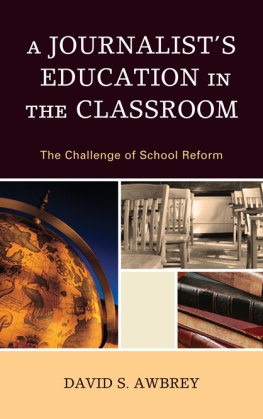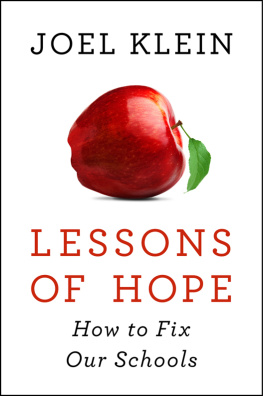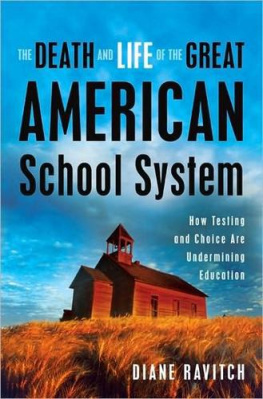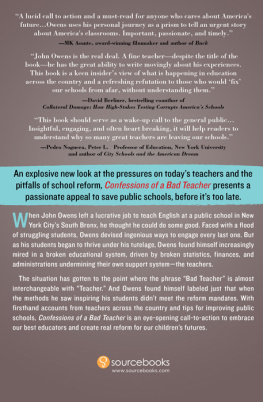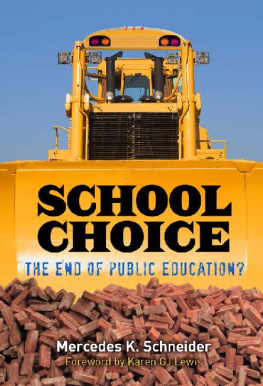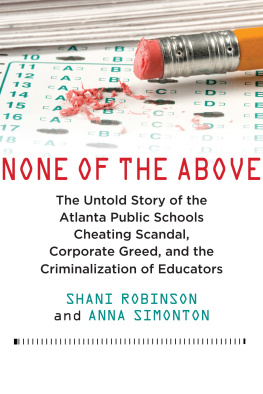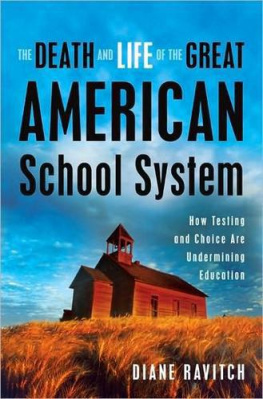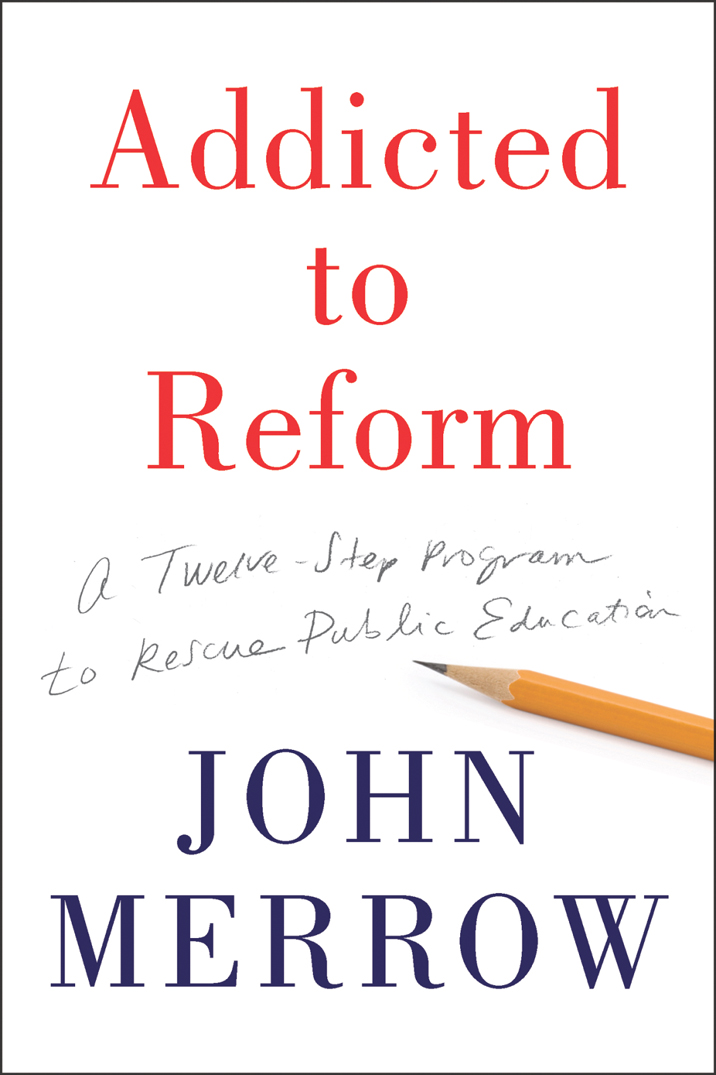
Also by John Merrow
The Influence of Teachers
Declining by Degrees (co-editor)
Choosing Excellence

2017 by John Merrow
All rights reserved.
No part of this book may be reproduced, in any form, without written permission from the publisher.
Requests for permission to reproduce selections from this book should be mailed to: Permissions Department, The New Press, 120 Wall Street, 31st floor, New York, NY 10005.
Published in the United States by The New Press, New York, 2017
Distributed by Perseus Distribution
ISBN 978-1-62097-243-4 (e-book)
CIP data is available
The New Press publishes books that promote and enrich public discussion and understanding of the issues vital to our democracy and to a more equitable world. These books are made possible by the enthusiasm of our readers; the support of a committed group of donors, large and small; the collaboration of our many partners in the independent media and the not-for-profit sector; booksellers, who often handsell New Press books; librarians; and above all by our authors.
www.thenewpress.com
Book design and composition by Bookbright Media
This book was set in Janson Text and Gill Sans
Printed in the United States of America
10 9 8 7 6 5 4 3 2 1
For my grandchildren, and yours

Table of Contents
Guide
Contents
While pundits and analysts will argue for years about the 2016 election results, left out of the conversation is an astounding fact: non-voters vastly outnumbered those who voted for either Donald Trump or Hillary Clinton. Approximately 130 million voters went to the polls in 2016. Clinton received 65,844,954 votes to Trumps 62,979,879, but more than 100 million Americans of voting age did not cast ballots.
In fact, if not voting were looked upon as a choice, similar to choosing a candidate, it would have won the popular vote in every presidential election since at least 1916. Americans have a bad habit of not voting. Only three times in the fifteen presidential elections since 1960 have more than 60 percent of the voting age population gone to the polls. The turnout in what we like to believe is the worlds greatest democracy generally hovers around 53 to 54 percent. It has dipped below 50 percent three times since 1916, most recently in 1996, when only 49.1 percent of the voting age population bothered to vote.
Who are these non-voters? Should we scorn them for their indifference? Dont they understand how many of their fellow Americans have died protecting their freedom and their right to vote? Surely we can agree that their not voting is deplorable behavior.
Not so fast. I have come to believe that most non-voters are behaving rationally. Feeling that they have no stake in our government, they dont vote. And why should they? Schooled to see themselves as insignificant, as adults they keep their heads down, stay uninvolved, and do their best to make ends meet.
Yes, I am holding public schools at least partly responsible for our consistently low voter turnout, because public education, an efficient sorting machine, is undemocratic to its core. Schools sort young children in two basic groups: a minority of winners who are placed on a track leading them to elite colleges, prominence, and financial success, and everyone else. While the rest arent labeled losers per se, they are largely left to struggle on their own. That experience leaves many angry, frustrated, and resentful, not to mention largely unprepared for life in a complex, rapidly changing society. Why would they become active participants in the political process, an effort that is almost always led by the now grown-up winners from their school days?
Although formal tracking has fallen out of favor, schools have subtle ways of designating winners and losers, often based as much on parental education and income, race, and class as innate ability. By third or fourth grade most kids know, deep down, whether the system sees them as winners bound for college or losers headed somewhere else.
Ironically, A Nation at Risk, the 1983 report that warned of a rising tide of mediocrity, may have made matters worse. In response, America put its eggs in the basket of student achievementas measured by student test scores. Believing we were raising academic standards by asking more of students, we were in fact narrowing our expectations. This practice went into high gear with the passage of the No Child Left Behind Act of 2001 and continued throughout the Bush and Obama administrations. What I call regurgitation education became the order of the day. This approach rewards parroting back answers, while devaluing intellectual curiosity, cooperative learning, projects, field trips, the arts, physical education, and citizenship.
This fundamentally anti-intellectual approach has failed to produce the results our nation claims to desire. Scores on our National Assessment of Educational Progress (NAEP) have largely remained flat and in some instances have gone down. Whats more, students arent even retaining what we are demanding they regurgitate. For example, a survey reveals that one-third of Americans cannot name any of the three branches of our government, and half do not know the number of U.S. senators.
Reducing kids to test scores has produced millions of high school graduates whose teachers and curriculum did not help them develop the habits of asking questions, digging deep, or discovering and following their passions. Because of how they were treated in school, many Americans have not grown into curious, socially conscious adults. This is not the fault of their teachers, because decisions about how schools operate are not made in classrooms. It was school boards, politicians, policy makers, and the general public that created schools that value obedience over just about everything else.
But the end result is millions of graduates who were rewarded with diplomas but have never participated in the give-and-take of ordinary citizenshiplike voting. Did they graduate from school prepared for life in a democracy, or are they likely to follow blindly the siren song of authoritarians? Can they weigh claims and counterclaims and make decisions based on facts and their familys best interests, or will they give their support to those who play on their emotions?
During the 2016 campaign, Donald Trump welcomed support from those he called the poorly educated, but thats the incorrect term. These men and women are not poorly educated, undereducated, or uneducated. They have been miseducated, an important distinction. Schools have treated them as objects, as empty vessels to pour information into so facts and figures can be regurgitated back on tests.
The sorting process used in schools has another result: it produces elitists (in both political parties) who feel superior to the largely invisible losers from their school days. Arguably, those chickens came home to roost in the 2016 presidential election. Candidate Clinton calling her opponents supporters a basket of deplorables was a gaffe that probably cost her the election. But in all likelihood she was speaking her personal truth, because, after all, her schools had identified her as a winner, one of the elite. Its perfectly understandable that she would not identify with the people who had been energized by Donald Trump. Most pundits, reporters, pollsters, and politicians fell into the same trap.


